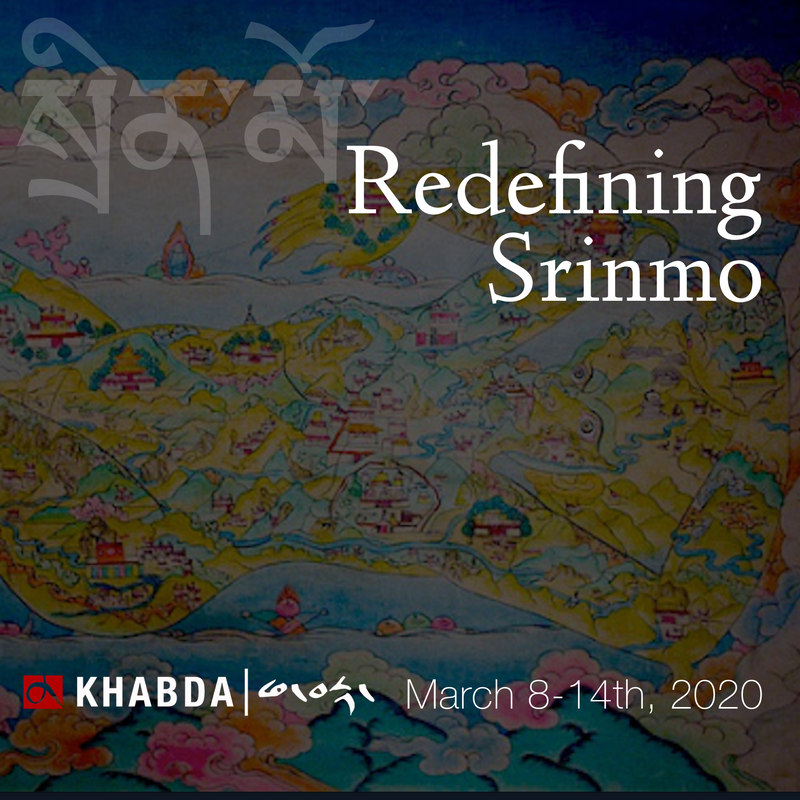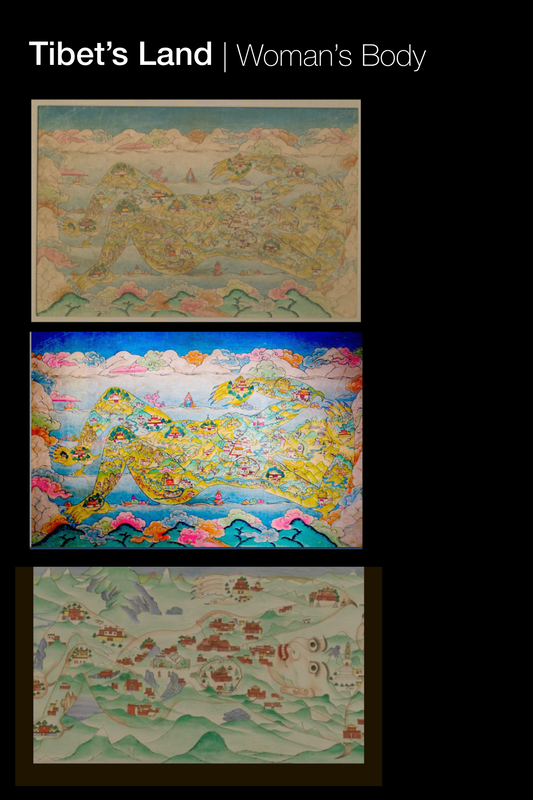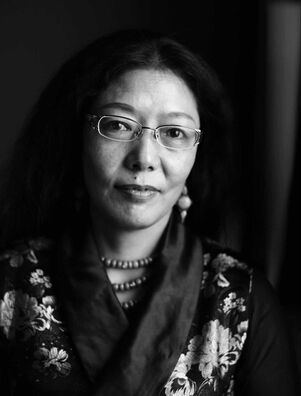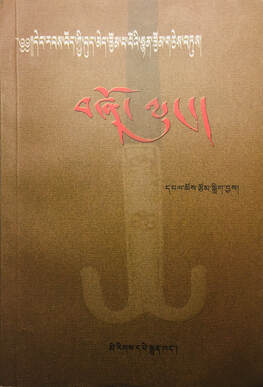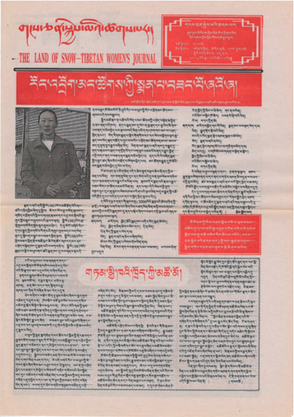|
To mark International Women's Day 2020, we celebrated the disruptive thought and visionary work of Professor Huamo Tso -- poet, scholar and powerful champion of Tibetan women's empowerment. Resisting conventional interpretations of Tibetan history, Gen Huamo Tso has drawn on the concept of srinmo (སྲིན་མོ་), ogress or demoness, to create important new women's spaces inside Tibet -- through women's literature, social critique and civic engagement in women's health and reproductive rights.
For this Machik Khabda, we introduced a new poem by Gen Huamo Tso in English translation. This piece recently caused a storm of discussion on Tibetan social media inside Tibet, and we were excited to share this with you through Machik Khabda. We hope people learned more about Gen Huamo's groundbreaking work over the past decades to redefine the position of women in Tibetan culture and society -- work we ardently support and we believe is critical for reshaping the landscape of gender politics in Tibet. |
THE MEANING OF SRINMO |
|
Here is the story of the Srinmo that has been transmitted and retold by Tibetan chroniclers, historians and Buddhist narrators down through the centuries: the physical land of Tibet is conceptualized as the body of a srinmo, a ferocious ogress or demoness, lying supine on her back (figure, right: traditional maps of Tibet as a woman's body). In the 7th century, it is solemnly said, this Srinmo-as-Tibetan-land fiercely resisted the introduction of the Buddhist religion. It was therefore deemed necessary to erect Buddhist chapels and temples to pin down the Srinmo's wild and unruly spirit into submission. And thus began the dawn of the Tibetan civilization.
With this narrative of the suppression of a primordial woman in "civilizing" Tibet, it is little wonder that this story of the Srinmo has long been troubling for many of us (see Beijing-based writer Tsering Woeser's not-to-be-missed analysis). Yet the Tibetan poet and scholar Huamo Tso (དཔལ་མོ་མཚོ་) chose the concept of srinmo as the organizing principle for her diverse body of work that amounts to an awakening of Tibetan feminist consciousness inside Tibet. Her visionary 2005 book project, Sholung, marked a milestone in that effort by bringing together Tibetan women writers from across Tibet for the first historic anthology of Tibetan women's writing. It was in Sholung that Gen Huamo's own personal manifesto for reimagining the place of women in Tibetan society appeared in her poem "I am a Woman" (ང་རང་ནི་བུད་མེད་ཡིན།), which reads in part: བུད་མེད་ནི་སྲིན་མོ་ཡིན། སྲིན་མོ་ནི་ཚེ་སྲོག་གི་འབྱུང་ཁུངས་ཡིན། ཚེ་སྲོག་གི་འབྱུང་ཁུངས་ནི་མཐར་ཐུག་གི་ནང་སྙིང་ཡིན། Women are srinmo / Srinmo are the source of life / The source of life is the inner essence of that which is ultimate. Clearly, Gen Huamo took back the term srinmo and made it her own. Instead of referencing the domination of women's bodies, she reinterpreted srinmo to mean the profound essence of nature as such. Having made that declaration, Gen Huamo drew on this revitalized concept of srinmo to launch an array of new initiatives championing the rights of Tibetan women. At the center of this was her founding in 2009 of the "Srinmo Association," (སྲིན་མོ་ཚོགས་པ་).* Dedicated to working for the health, well being, and reproductive rights of Tibetan women in underserved communities, the Srinmo Association has worked at the grassroots level to send volunteer teams into remote herding and rural communities that lack infrastructure and resources (to learn more about these projects and how Machik has been able to work in solidarity, see below). In light of Gen Huamo's redefining of the srinmo concept, we invite you to read and discuss her newly released poem, I am who I am (ང་ནི་ང་ཡིན།་) that caused a storm of discussion and debate when it was released in 2019 on Tibetan social media inside Tibet. We also include her celebrated poem, Approach Me Not (ང་ལ་བཅར་མ་ཡོང་།) from 2011.
Scroll down for Discussion Guide & Further Reading
*Full name, སྲིན་མོ་བུད་མེད་རོགས་སྐྱོར་ཚོགས་པ་ (Srinmo Association for the Support of Women). | |||||||||||||||||||
|
HUAMO TSO TIBETAN POET, SCHOLAR, FEMINIST VISIONARY
Born in a drokpa tent, Huamo Tso (དཔལ་མོ་་མཚོ་) is a poet, scholar, essayist, women rights advocate and civic leader. She lectured in Haibei Teacher's School, Qinghai Province, and has been an Associate Professor of Tibetan Studies at Northwest Nationalities University in Lanzhou, Gansu, since 1997. She has devoted her life to teaching and writing, producing several books and numerous magazine articles written in Tibetan. She has emerged as an inspiring champion of gender equality and empowerment in Tibetan civil society and has initiated several major women's projects, including Sholung: An Anthology of Contemporary Tibetan Women's Poetry, the first ever collection of Tibetan women's writing, and Snowland Tibetan Women's Journal, the first ever Tibetan-language quarterly magazine devoted to women's affairs. Through her leadership, Huamo Tso has brought into the public forum issues ranging from socio-economic disparities and women's reproductive rights to the impact of HIV/AIDS on women in disenfranchised communities.
|
NEW SPACES FOR TIBETAN WOMEN
|
SHOLUNG THE FIRST COLLECTION OF TIBETAN WOMEN'S WRITING
In the long history of Tibetan literature spanning over a thousand years, Sholung (བཞོ་ལུང་།) was the first ever book of Tibetan's women's writing to be published. A visionary project of Gen Huamo Tso, this historic anthology features 23 eclectic voices of Tibetan women reflecting a diversity of geographies, occupations, ages, education, and family backgrounds. The writings, mostly in poetry form, highlight the themes of women's livelihoods, pastoralism, motherhood, the natural environment, love, cultural and historical memory, and spirituality. This pioneering collection features work by Tibetan women writing exclusively in Tibetan language. We are proud that Dr. Losang Rabgey, Machik cofounder and women's rights advocate, helped to produce this historic book that has already reshaped the trajectory and development of Tibetan women's literature. Losang la will soon be sharing her reflections on the making of Sholung (stay tuned!). To purchase a copy of Sholung, contact info@machik.org. |
|
THE SNOWLAND TIBETAN WOMEN'S JOURNAL
The Snowland Tibetan Women's Journal (གངས་ཅན་སྐྱེས་མའི་ཚགས་པར།) was the first ever quarterly print publication on women's issues in Tibet. Founded and created by Professor Huamo Tso, this pioneering journal provided an unprecedented and dynamic forum for Tibetan women writers to discuss compelling social issues such as the impact of HIV/AIDS on Tibetan women. Machik was honored to be part of sponsoring the development of the journal, enabling several students of Gen Huamo to become involved in the writing and editing process. The Snowland Tibetan Women's Journal was not only an innovative space for marginalized women's voices and issues, it was also a tangible example of the impact of Huamo's commitment to mentorship of young Tibetan women. In this translated narrative piece, Professor Huamo Tso recounts the origin story of the Snowland Journal and discusses the critical significance of having public spaces dedicated to highlighting and celebrating Tibetan women's lived experiences. Due to the highly popular nature of the prints, publication of the quarterly magazine was later disbanded. To read a sample print, see below.
| |||||||
|
|
THE SRINMO ASSOCIATION
Launched in 2009, the Srinmo Association convenes Tibetan women through a number of grassroots programs that focus on developing platforms for women's literature and women's health in Tibet. In 2013, Machik was truly honored to host Professor Huamo Tso as a guest lecturer and teacher for three days at our Summer Enrichment Program (SEP) for Tibetan youth from across Tibet, held then on the southern shores of Tso Ngonpo (Qinghai Lake) in Amdo. During her stay at SEP, Gen Huamo spoke in tents packed with young Tibetan women and men from across Tibet, teaching about gender dynamics in creative and spellbinding ways. She also discussed the critical role of mentorship, higher education, school systems, career development, Tibetan language and ethics/values in navigating life beyond adolescence. Machik's Summer Enrichment Program (SEP) was a unique learning experience that brought Tibetan children from across the plateau, alongside volunteer organizers from Tibet, China and internationally, for a month-long enrichment program focused on growing cross-cultural understanding and care in order to build a stronger future for Tibet. SEP began in 2004 and took place 11 times across Tibet and Chinese cities. To see Gen Huamo in action with the young Tibetans at SEP, checkout the video clip (left). |
Discussion Guide & Further Reading
|
For this Khabda, we will be reading and discussing Gen Huamo's poem, I am who I am (ང་ནི་ང་ཡིན།་), released in 2019, along with her commentary she has published online a few weeks ago, Commentary on the background of the poem "I am who I am" ༼ང་ནི་ང་ཡིན༽ ཞེས་པའི་སྣན་རྩོམ་གྱི་རྒྱབ་ལྗོངས་གླེང་བ།. We also encourage you to read her celebrated piece, Approach Me Not (ང་ལ་བཅར་མ་ཡོང་།) published 2011. Both poems were written in Tibetan and have been translated into English (thank you to the translators who made this possible!).
For your Khabda gathering, we are also providing a Discussion Guide that we hope will be helpful in your discussions. Please see the Suggested Activities in the Guide for ideas on creating a dynamic and creative space of continued learning.
Further reading
| |||||||
THANK YOU
Our profound appreciation to Professor Huamo Tso for her groundbreaking efforts in creating new feminist ground for Tibetan women everywhere. Her work is an inspiration. For bringing forth this Khabda, we thank the translators, Jusal Drolma & Kunchok Kyid. We also thank Tenzin Dickyi & Dhondup Rekjong for their published translation of the poem Approach Me Not which we reference as a learning material for this Khabda.
Our profound appreciation to Professor Huamo Tso for her groundbreaking efforts in creating new feminist ground for Tibetan women everywhere. Her work is an inspiration. For bringing forth this Khabda, we thank the translators, Jusal Drolma & Kunchok Kyid. We also thank Tenzin Dickyi & Dhondup Rekjong for their published translation of the poem Approach Me Not which we reference as a learning material for this Khabda.
Be part of the Khabda community
To learn more about becoming a local Khabda host in your community, contact us at info@machik.org.
- Find out where local Machik Khabdas are taking place by contacting info@machik.org
- Share your thoughts on Sholung on Instagram and Facebook using hashtags such as #SrinmoKhabda #Sholung #SnowlandJournal and #MachikKhabda
- We want to hear from you! What are your ideas, questions, and thoughts on Srinmo Khabda? Write a blog post, book review, poetry analysis and share it with us @machik_online or info@machik.org!
- Check back here for news and updates from the Machik Khabda community.
To learn more about becoming a local Khabda host in your community, contact us at info@machik.org.
